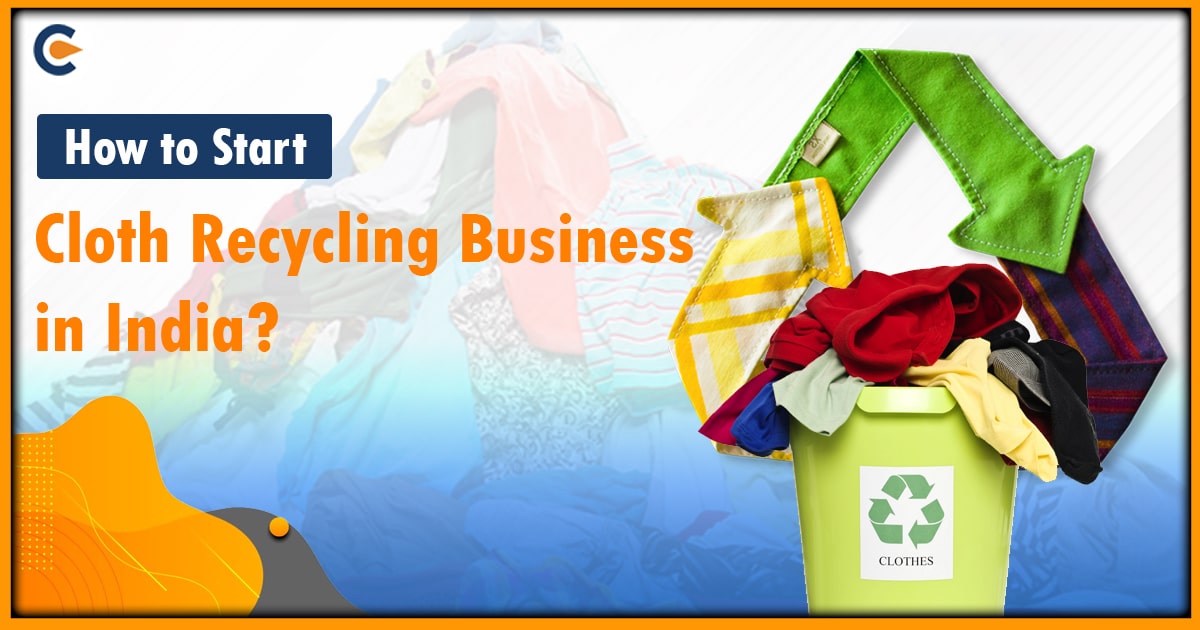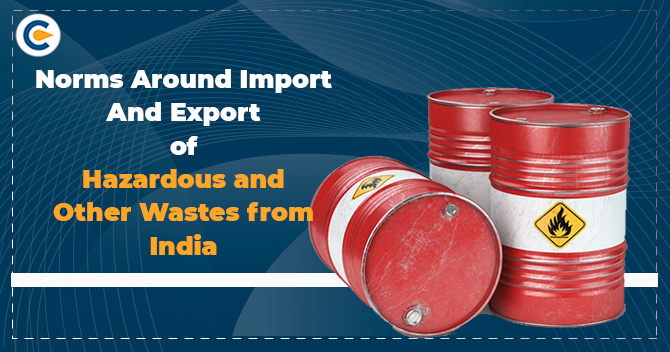Whenever we discard a piece of clothing, simply because it is not in line with the current fashion trends, or because it doesn’t fit us now, or for any other reason, do we spare a second thought about the environmental impact it will have? Probably not! This mindless discarding of fabric and clothes is leading to heaps of fabric waste piling up in landfills.
If you are considering starting a Cloth Recycling in India, let us tell you that a major chunk of this fabric waste is recyclable or reusable; however, only an abysmally low percentage of these clothes are recycled. This implies that there are a lot of opportunities for budding businessmen who are interested in the textile industry, particularly in cloth recycling in India, and, at the same time, want to contribute their share towards sustainable development. Therefore, Cloth Recycling in India could be a lucrative business avenue for you to consider in the textile industry. In this article, we will tell you why, and in addition to that, we will throw some light on how to start a Cloth Recycling Business in India.
Understanding Cloth Recycling
Before we get into the specifics of starting the business, let us first understand what Cloth Recycling is. Cloth recycling is a process by which fibre, yarn, or fabric is recovered and reprocessed into new products. In simpler words, it means collecting the clothes that were otherwise discarded and processing them in order to transform them into new products, which offers various environmental and economic benefits.
Growing Incentives for Cloth Recycling
Have you heard of various brand owners now taking up initiatives to promote recycling and investing in various such programs? For instance, famous brands like H&M can be seen promoting the recycling of clothes by promoting their Garment Collecting Programme, where they accept unwanted clothes of any brand, in any condition, in their stores, in exchange for a voucher on the donator’s next purchase. This is how they have begun not only marketing second-hand clothes but also recycling them by turning them into new products, and whatever is left is shredded into fibres and used to make other materials.
Why is there a growing need for cloth recycling in India, and what makes this a lucrative option for commercial businesses to invest in? Let’s look at some of the following reasons:
Sustainability
In light of the sustainability principles being promoted in every other industry and sector and the world becoming an environmentally conscious place, there is a need to promote such practices in the textile industry. In fact, due to the high consumption of natural resources in the textile industry, it is an ideal avenue for promoting recycling.
Increasing Usage
Further, with the increase in population and growing materialistic tendencies of people, consumption in this industry is going to grow with time, and therefore, the consequent generation of waste is also going to increase rapidly due to the dearth of effective and proper disposal of such waste.
Greater Avenue
In the coming future, more and more regulations and compliances can be expected to be implemented, which will mandate the setting up of recycling for cloth or fabric waste. Thus, common sense dictates that cloth recycling in India is not only needed from an environmental perspective, but it can also be a profitable and lucrative avenue for those people in business who care more about profit-making.
Environmental Concern
Apart from the commercial and financial point of view, there is a growing need to reduce our carbon footprint across sectors to have an overall meaningful impact. Resources are finite and are getting depleted at a pace you and I cannot even begin to fathom. Therefore, the need of the hour is to preserve these resources and, at the same time, recycle the ones that can be recycled in order to prevent their speedy depletion. If we take a look at the textile industry particularly, apart from the rampant usage of these natural resources, the waste generated is also a concern, and that is where cloth recycling in India comes into the picture.
Advantages of Cloth Recycling in India
Cloth Recycling has been around for a while, for altruistic purposes or environmental concerns. With time, the cloth recycling business can be considered an enticing business opportunity in India for the following reasons:
Environmental Concern
As the world is becoming environmentally conscious day by day, there is an increased demand for sustainable products and services and further mandates to adopt waste reduction strategies.
Availability of Raw Material
As discussed, the waste generated in the Indian Textile Industry is tremendously high; thus, there is no dearth of raw materials available for cloth recycling businesses. On top of that, this industry requires less energy, which further puts a burden on our natural resources.
Sustainable Fashion
Owing to the harmful chemicals and dyes used in the textiles industry, it has become one of the incredibly harmful industries for the planet. Concepts like Sustainable Fashion have evolved, which basically is used to describe those products or services that are carbon-neutral and incorporate ecological integrity. With the world becoming aware of the harmful effects of their consumption tendencies, it is becoming even more enticing for brand owners to adopt sustainable practices to gain that extra advantage in the extremely competitive market.
Steps Involved in Setting up a Cloth Recycling Business in India
Now that much has been discussed about the growing need and the benefits of setting up a business relating to cloth recycling in India let us have a look at the various steps that need to be undertaken before establishing the business; after all, one cannot simply begin from tomorrow. Therefore, before setting up your recycling plant, you must consider the following:
In-Depth Study and Research
Just like starting any other business or commercial activity, one needs to conduct extensive research in order to enter a new market of which he probably has no knowledge. You may even require expert advice and consultation to identify the potential risks and liabilities involved in cloth recycling in India and to understand the demand and supply ratio of that particular industry. Hence, it is always advisable to conduct thorough research before entering a new venture and do your own cost-benefit analysis or simply hire a professional to do that for you.
Identification of market
Identifying a target market is the foundational step in starting a cloth recycling in India. This will help you market your business and ensure your efforts do not go to waste. After all, the ultimate goal of starting a business is to earn profit and make money. Therefore, just like in any other business, you need to identify a market for recycled clothes or products formed from those recycling processes and plan things accordingly.
Make a Business Plan
Once you have identified your market for cloth recycling in India and done your research, the next crucial step is to construct a business plan to answer all the relevant questions regarding customers, sellers, competition in the market, pricing strategies, investment plans, financing, ultimate goals, etc., to have a clearer picture in mind.
Funding
IMARC Group, a leading market research company, has published a report on the India Textile Recycling Market called ‘Industry Trends, Share, Size, Growth, Opportunity, and Forecast for 2023-2028’, which provides a detailed analysis of the textile recycling industry in India. The report particularly highlights the regional and competition analysis, and according to it, the Indian textile market is expected to reach 375 million US Dollars by 2028, demonstrating a growth rate of 3.4% during 2023-2028. Finding investors is never going to be a cakewalk in any business or industry. Still, studies and reports like these supporting your claims might incentivize many investors and venture capitalists to invest in cloth recycling in India.
Other Investments
Cloth Recycling in India can be a capital-intensive business. You cannot simply start it without having a designated space, required machinery, equipment like cutting or shredding machines, labour, etc. Therefore, you will be required to invest in the same in order to kickstart your cloth recycling business, and the amount of capital obviously depends on your business plan and the scale you want to work on.
Ensured Supply-Chain
To start a cloth recycling in India, you need to have a constant supply of textile or fabric waste, for which you need to have connections with people involved in the process of collecting fabric waste and partner with them to ensure a constant supply of such waste to keep the plant running. Furthermore, the major chunk of fabric waste comes from households and textile manufacturing and retail units.
Legal and Regulatory Compliances
Every industry and commercial enterprise must get the necessary approvals and licenses from the concerned authorities regulating their domain, without which one cannot set up a business. Similarly, in order to start a cloth recycling in India, there are certain licensing and certifications required, such as:
Business Registration
In order to kickstart cloth recycling in India, it is advisable that you get it registered either as a sole proprietorship, an LLP, a partnership, or any other suitable legal structure as per your requirements. This will require you to obtain the necessary incorporation certification.
GST Registration
Depending on your turnover, you may be required to get the necessary GST Registration and file your returns accordingly, and the failure to do so may attract adverse consequences.
Environmental Clearances
Clothes and textiles are often bleached, dyed, coloured, etc., using various chemicals and dyes which may be toxic, and thus the industry has been placed under the red category of industries by the Central Pollution Control Board (CPCB)[1] due to the environmental and health risks associated with it. Therefore, in order to engage in cloth recycling in India, NOCs (No Objection Certificates) are required from the concerned authorities. The State Pollution Control Board (SPCB) grants the permission or consent to establish and to operate, provided all the environmental regulatory compliances are being met by your business, for which you may be required to furnish various documents such as ownership documents, layout plan, water and electricity connection details, land use classification, analysis and monitoring reports relating to the emissions from the industry, etc.
Municipal Licenses
The concerned municipalities of your state and district issue a Trade Licence, which is required to conduct cloth recycling in India in a specific jurisdiction. It is just as important as obtaining other licenses and permits, as failure to obtain the same may lead to shutting down your business.
Factory License
The Factories Act of 1948 mandates you to obtain a Factory License depending on the size and the nature of your operations. Therefore, as a factory owner, you are required to register your plant/industry unit and obtain a factory license in order to ensure that safety and health management systems have been put in place.
Waste Management License and Permits
Undertaking recycling of any kind will also generate waste, and in case it results in emissions of the hazardous category, then you are further required to obtain registration as a hazardous waste generator and obtain a permit for proper and safe disposal of such waste generated while performing cloth recycling in India.
Other Registrations or Licenses
Apart from the above-mentioned permits and licenses, there may be other kinds of licenses that may be required depending on your business needs, such as Import and Export License, Trademark Registration, ESIC Registration, Insurance Policies, Fire NOC, etc.
Although these licenses and permits can be obtained on your own, but in case you are caught in the web of these intricate and complex compliances and regulations as they are at times region or state-specific. They further keep getting amended, or in case you have any specific requirements, you should seek expert advice or hire professional services to help you achieve the same.
Conclusion
The emerging trend of sustainable fashion, along with the ever-increasing demand for clothes with greater ecological integrity and the increasing consumer awareness of the detrimental effects of producing new clothing on the environment, is among the key factors stimulating the Indian textile recycling market. Apart from being profitable, cloth recycling in India is also a socially responsible venture as it can contribute to environmental conservation and resource preservation while making a profit. By following the guidelines outlined in this article, you can embark on a successful journey in the cloth recycling in India, which is the most sustainable solution to combat the growing textile waste crisis.
FAQs:
Yes, India has been practising numerous recycling activities and clothes recycling in particular, has been practised at household and industrial levels.
According to a report in July 2022 titled “Waste to Wealth”, around 8.5% of the global textile waste is accumulated in India every year, and out of this, 59% is reused and recycled, while the remaining is either incinerated, downcycled or simply ends up getting accumulated in landfill.
Unwanted clothes are collected and segregated in order to determine what can be used for the purpose of reselling and what can be utilized for recycling. The latter is then simply shredded via hand or machines to get fibres, which are eventually cleaned, realigned, and re-spun into yarn.
Yes, cloth recycling is a profitable industry and is further going to advance at a CAGR of 10.9% through 2033.
According to the report published by the IMARC Group, titled “India Textile Recycling Market: Industry Trends, Share, Size, Growth, Opportunity and Forecast 2023-2028”, the Indian Textile Recycling market size had reached US$ 308.7 million in 2022 and is further expected to reach US$ 375 million by 2028.
According to a report by the Indian Textile Journal, around 1 million tons of textiles are thrown away yearly.
Read Our Article: How To Start A Vehicle E-Waste Recycling Business?











